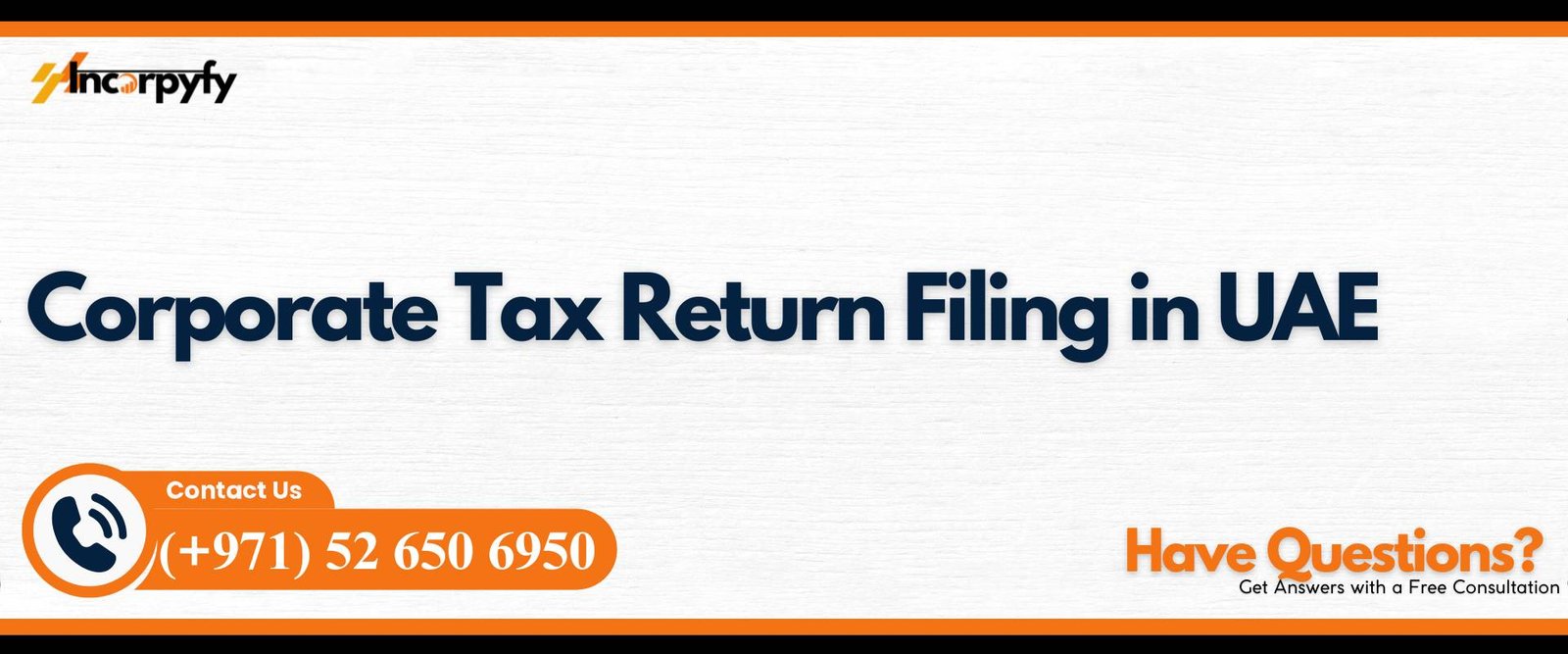
The United Arab Emirates (UAE) has evolved into a dynamic business hub for local and global investors. With the recent introduction of the corporate tax regime, all businesses must now comply with new tax regulations to maintain legal standing. One of the most critical elements of this compliance is corporate tax return filing in UAE.
Whether you’re a mainland company, a Free Zone business, or a multinational corporation, understanding how to file corporate tax returns correctly can save you from penalties and boost your business credibility.
Let’s break it down step by step and cover everything you need to know.
What is Corporate Tax Return Filing in UAE?
Corporate tax return filing is the process where registered companies submit their taxable income, deductions, and liabilities to the Federal Tax Authority (FTA) of the UAE. It’s not just a financial exercise—it’s a legal obligation under the UAE Corporate Tax Law.
Who Must File a Corporate Tax Return?
All taxable persons—including UAE-resident companies, branches of foreign companies, Free Zone entities, and even some individuals conducting business activities—must file a corporate tax return if they fall within the taxable threshold.
Key exemptions exist, but even exempt persons must register and may need to file a return for record-keeping purposes.
Corporate Tax Framework in UAE
The UAE follows a federal tax system under the Ministry of Finance, and the FTA is the implementing authority. As of now, the corporate tax rate is 9% on taxable profits exceeding AED 375,000. Anything below that threshold is taxed at 0%.
Types of Entities Covered
- Mainland Companies
- Free Zone Entities (subject to qualifying criteria)
- Branches of Foreign Companies
- Self-employed Professionals (meeting the criteria)
Timeline and Deadlines for Filing Corporate Tax Returns
The UAE gives companies 9 months from the end of their financial year to file their corporate tax return. This provides ample time for financial reconciliation, audit, and submission.
Important Dates to Remember
- Financial year ends on December 31 → Return due by September 30
- Financial year ends on March 31 → Return due by December 31
Always confirm your tax period and filing deadline via the FTA portal.
Documents Required for Corporate Tax Filing in UAE
Filing a corporate tax return in UAE involves preparing and submitting several financial documents.
List of Mandatory Documents
- Audited financial statements
- Tax computation sheet
- Supporting schedules for deductions and exemptions
- Transfer pricing documentation (if applicable)
- Trade license and Emirates ID of owners
Ensure all your documents are clear, valid, and audited (if your revenue exceeds the threshold requiring an audit).
Steps to File a Corporate Tax Return in UAE
Understanding the step-by-step process can reduce errors and delays. Here’s a simplified flow:
Register for Corporate Tax
All taxable entities must register for corporate tax through the FTA’s EmaraTax portal. You’ll receive a Tax Registration Number (TRN).
Maintain Proper Accounting Records
You need to prepare your books of accounts according to International Financial Reporting Standards (IFRS). These include income statements, balance sheets, and cash flow statements.
Compute Your Taxable Income
Calculate your net profit and adjust it based on deductible expenses, non-deductible expenses, and any exemptions applicable.
Submit the Corporate Tax Return Online
File the return through the FTA portal, along with supporting documentation. You must declare:
- Total revenue
- Total expenses
- Net taxable profit
- Tax payable
Pay the Tax Due
Once submitted, make the corporate tax payment via the FTA portal using acceptable payment methods.
Penalties for Non-Compliance
Failing to file a corporate tax return in UAE within the given timeline can result in hefty fines and legal trouble.
Common Penalties
- Failure to register → AED 10,000
- Late return filing → AED 500 for each month of delay
- Incorrect return → Penalties vary based on intent and amount
- Failure to maintain records → AED 10,000 or more
Avoid penalties by staying compliant and working with tax consultants in UAE.
Understanding Taxable and Non-Taxable Income
Knowing what counts as taxable income is crucial. Here’s a general breakdown:
Taxable Income Includes:
- Revenue from goods and services
- Rental income (for corporate entities)
- Capital gains
- Interest and royalties (in most cases)
Non-Taxable Income Includes:
- Dividends from UAE-resident companies
- Qualifying intra-group transactions
- Certain Free Zone income, if they meet qualifying criteria
Corporate Tax for Free Zone Entities
Free Zone companies in UAE enjoy preferential tax treatment, but they still need to comply with corporate tax regulations.
Qualifying Free Zone Person (QFZP)
To benefit from 0% corporate tax, Free Zone entities must:
- Maintain adequate substance in the UAE
- Derive income from qualifying activities
- Not conduct business with the mainland UAE
- Comply with transfer pricing rules
Non-compliance with any of the above may result in 9% corporate tax.
Transfer Pricing Compliance in UAE
Transfer pricing refers to the pricing of transactions between related parties. UAE businesses that deal with subsidiaries, parent companies, or sister entities must follow OECD-based Transfer Pricing rules.
Key Transfer Pricing Requirements
- Maintain transfer pricing documentation
- File a disclosure form
- Apply the arm’s length principle
If your business crosses the threshold, this is mandatory.
Accounting Standards for Corporate Tax in UAE
To ensure accurate reporting, companies must follow internationally recognized accounting standards.
Applicable Accounting Framework
- IFRS is mandatory for larger businesses.
- IFRS for SMEs is allowed for smaller businesses.
Failure to follow proper accounting standards may lead to return rejection or penalties.
Audit Requirements for Corporate Tax Return
While not every business must audit their books, certain thresholds apply:
Who Must Submit Audited Accounts?
- Businesses with revenue above AED 3 million
- Free Zone entities seeking QFZP status
- Companies in regulated sectors
Audited accounts offer transparency and help validate your tax return.
Common Mistakes to Avoid in Corporate Tax Filing
Even minor errors can lead to delays or penalties. Here are some common pitfalls:
Avoid These Errors
- Misreporting income or expenses
- Ignoring related party transactions
- Filing beyond deadline
- Submitting unaudited or unverified accounts
- Skipping registration, assuming exemption
Always review your return before submitting.
Benefits of Filing Corporate Tax Returns Accurately
While corporate tax filing is a legal requirement, it also brings benefits:
Why Accurate Filing Matters
- Builds credibility with investors and banks
- Ensures legal compliance
- Allows you to claim deductions and exemptions
- Prepares your business for future audits or M&A
Accurate tax returns reflect a healthy business operation.
How Professional Help Can Make the Process Easier
Corporate tax filing may seem overwhelming, especially for new businesses in UAE. That’s where tax advisors come in.
Why Hire a Tax Consultant in UAE?
- They know the local laws and updates
- They help reduce tax liabilities
- They assist in transfer pricing compliance
- They help avoid costly mistakes
Working with a business setup and tax consultant can save time and money.
Digital Filing Through EmaraTax Portal
The FTA’s EmaraTax platform is the official portal for corporate tax return filing in UAE.
Features of EmaraTax
- Easy registration and login
- Upload documents and statements
- File returns securely
- Track status and payment history
EmaraTax is user-friendly, but businesses must ensure accurate data entry.
How to Prepare for Your First Corporate Tax Filing
If this is your first year under the UAE Corporate Tax Law, start early.
First-Time Filing Checklist
- Register for tax on the FTA portal
- Maintain clean accounting records
- Identify if you fall under Free Zone tax benefit
- Consult with a tax expert
- Begin preparation 3–4 months before deadline
Being proactive helps you stay stress-free during filing season.
What Happens After You File?
Once you file your return:
- You’ll receive a confirmation receipt
- The FTA may request clarifications or documents
- If audited, you must cooperate and submit all details
- You must keep your records for at least 7 years
Conclusion
Corporate tax return filing in UAE is not just about submitting numbers. It’s about aligning your business with the UAE’s tax and regulatory environment. Timely, accurate tax filing helps your business grow and stay out of legal trouble.
If you’re unsure about where to start or want expert guidance, work with Business Setup Consultants in Dubai, UAE. They provide tailored support for tax registration, compliance, filing, and financial planning—so you can focus on what you do best: running your business.
Frequently Asked Questions (FAQs)
Who needs to file corporate tax in the UAE?
Any business or person conducting business activities in the UAE that exceeds the AED 375,000 profit threshold must file a corporate tax return.
When is the corporate tax return due in UAE?
Companies must file within 9 months from the end of their financial year. For example, if your fiscal year ends in December, you must file by September 30.
What is the penalty for late filing of corporate tax in UAE?
Late filing attracts a penalty starting from AED 500 per month, increasing the longer the delay continues.
Can Free Zone companies benefit from 0% corporate tax?
Yes, if they meet the Qualifying Free Zone Person (QFZP) criteria including income source, substance, and transfer pricing compliance.
Is an audit mandatory for corporate tax filing?
An audit is mandatory for certain businesses such as those with revenue over AED 3 million or Free Zone entities looking to claim 0% tax benefits.






